Business and Corporate Law Case Study Analysis: LAW6000, Module 10
VerifiedAdded on 2022/12/15
|10
|2769
|149
Case Study
AI Summary
This document presents a comprehensive case study analysis addressing various aspects of business and corporate law. It begins with an examination of contract law, specifically focusing on the formation and enforceability of agreements, as seen in the scenario involving Jeff and Tina. The analysis delves into the issue of whether a 'Head of Agreement' constitutes a binding contract, considering the intentions of the parties and the presence of conditions such as the need for a formal contract and financing. Moving on to corporate law, the case study explores director's duties, examining the responsibilities of company directors and their potential liabilities under relevant legislation, particularly in situations involving unpaid debts and potential breaches of fiduciary duties. The analysis extends to agency law, dissecting the relationship between principals and agents, with a focus on the scope of authority (actual and ostensible) and the consequences of exceeding such authority. The case study examines the actions of agents and the implications for both the principal and third parties. Finally, the analysis considers the law of negligence, specifically addressing the elements required to establish a negligence claim, including duty of care, breach of duty, and damages. The case study applies these principles to a scenario involving a fashion designer and a model, assessing liability for harm caused by a defective product. The document offers detailed legal reasoning and practical advice for each case study, referencing relevant case law and legislation to support the analysis.

1
Title page
Name of the student
Student Id
Title page
Name of the student
Student Id
Paraphrase This Document
Need a fresh take? Get an instant paraphrase of this document with our AI Paraphraser
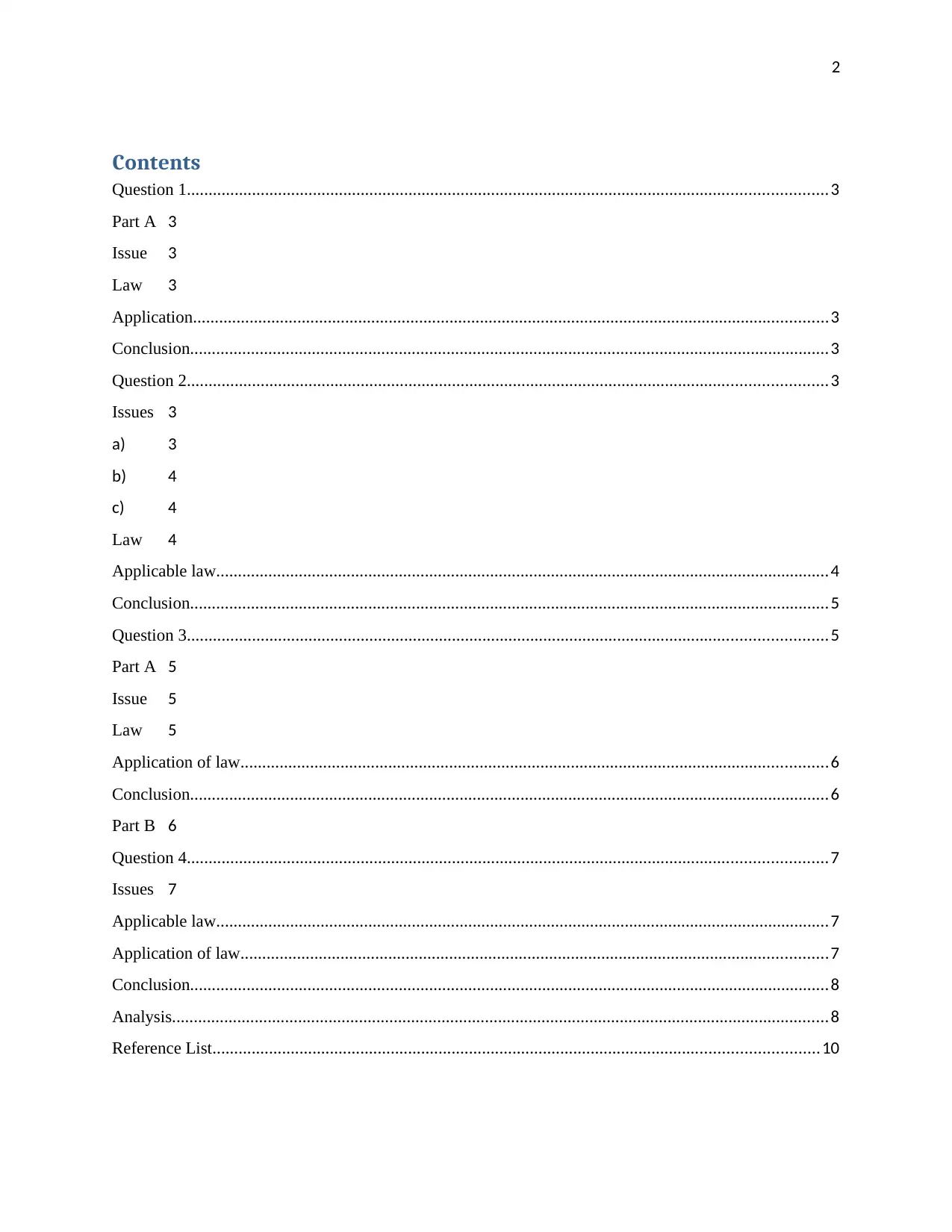
2
Contents
Question 1...................................................................................................................................................3
Part A 3
Issue 3
Law 3
Application..................................................................................................................................................3
Conclusion...................................................................................................................................................3
Question 2...................................................................................................................................................3
Issues 3
a) 3
b) 4
c) 4
Law 4
Applicable law.............................................................................................................................................4
Conclusion...................................................................................................................................................5
Question 3...................................................................................................................................................5
Part A 5
Issue 5
Law 5
Application of law.......................................................................................................................................6
Conclusion...................................................................................................................................................6
Part B 6
Question 4...................................................................................................................................................7
Issues 7
Applicable law.............................................................................................................................................7
Application of law.......................................................................................................................................7
Conclusion...................................................................................................................................................8
Analysis.......................................................................................................................................................8
Reference List...........................................................................................................................................10
Contents
Question 1...................................................................................................................................................3
Part A 3
Issue 3
Law 3
Application..................................................................................................................................................3
Conclusion...................................................................................................................................................3
Question 2...................................................................................................................................................3
Issues 3
a) 3
b) 4
c) 4
Law 4
Applicable law.............................................................................................................................................4
Conclusion...................................................................................................................................................5
Question 3...................................................................................................................................................5
Part A 5
Issue 5
Law 5
Application of law.......................................................................................................................................6
Conclusion...................................................................................................................................................6
Part B 6
Question 4...................................................................................................................................................7
Issues 7
Applicable law.............................................................................................................................................7
Application of law.......................................................................................................................................7
Conclusion...................................................................................................................................................8
Analysis.......................................................................................................................................................8
Reference List...........................................................................................................................................10

3
⊘ This is a preview!⊘
Do you want full access?
Subscribe today to unlock all pages.

Trusted by 1+ million students worldwide
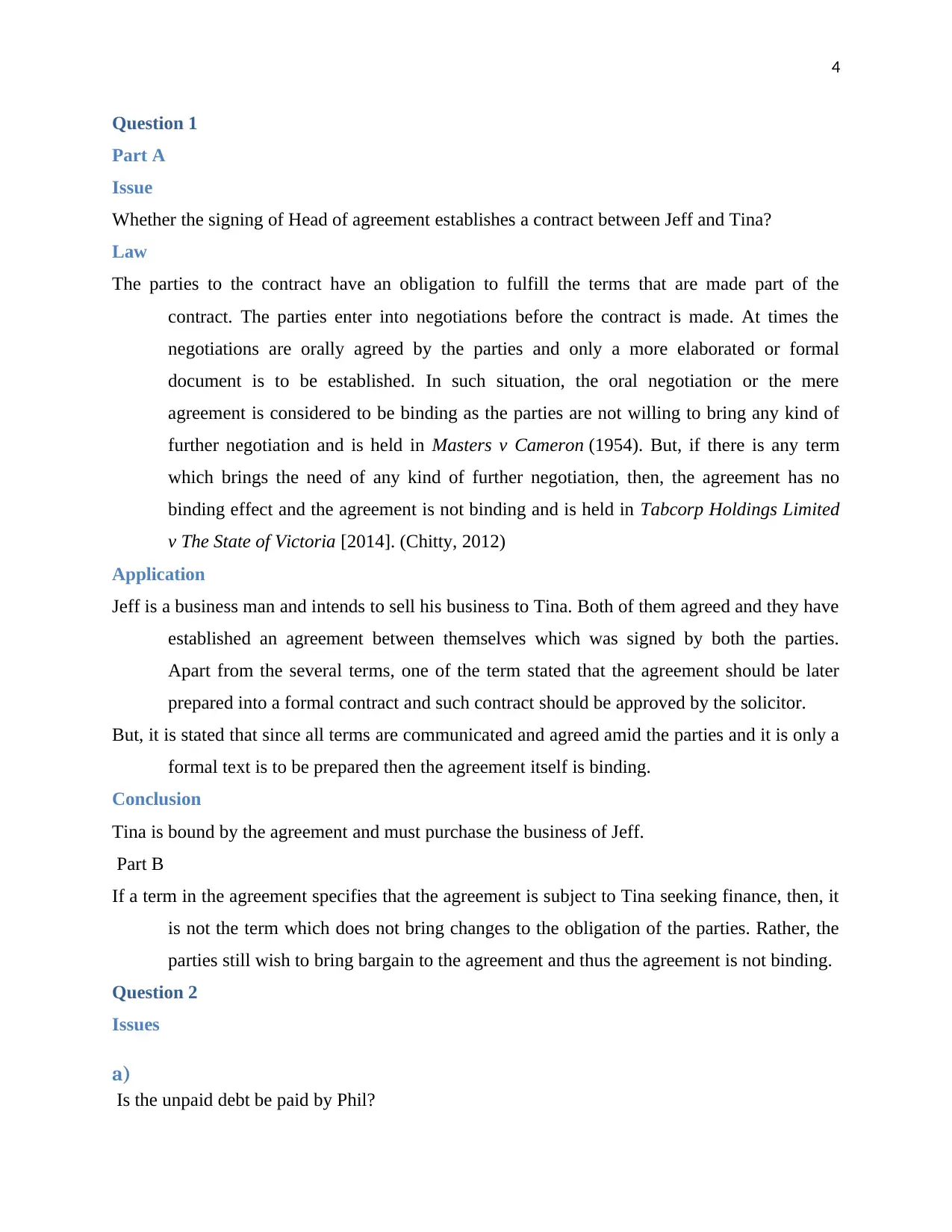
4
Question 1
Part A
Issue
Whether the signing of Head of agreement establishes a contract between Jeff and Tina?
Law
The parties to the contract have an obligation to fulfill the terms that are made part of the
contract. The parties enter into negotiations before the contract is made. At times the
negotiations are orally agreed by the parties and only a more elaborated or formal
document is to be established. In such situation, the oral negotiation or the mere
agreement is considered to be binding as the parties are not willing to bring any kind of
further negotiation and is held in Masters v Cameron (1954). But, if there is any term
which brings the need of any kind of further negotiation, then, the agreement has no
binding effect and the agreement is not binding and is held in Tabcorp Holdings Limited
v The State of Victoria [2014]. (Chitty, 2012)
Application
Jeff is a business man and intends to sell his business to Tina. Both of them agreed and they have
established an agreement between themselves which was signed by both the parties.
Apart from the several terms, one of the term stated that the agreement should be later
prepared into a formal contract and such contract should be approved by the solicitor.
But, it is stated that since all terms are communicated and agreed amid the parties and it is only a
formal text is to be prepared then the agreement itself is binding.
Conclusion
Tina is bound by the agreement and must purchase the business of Jeff.
Part B
If a term in the agreement specifies that the agreement is subject to Tina seeking finance, then, it
is not the term which does not bring changes to the obligation of the parties. Rather, the
parties still wish to bring bargain to the agreement and thus the agreement is not binding.
Question 2
Issues
a)
Is the unpaid debt be paid by Phil?
Question 1
Part A
Issue
Whether the signing of Head of agreement establishes a contract between Jeff and Tina?
Law
The parties to the contract have an obligation to fulfill the terms that are made part of the
contract. The parties enter into negotiations before the contract is made. At times the
negotiations are orally agreed by the parties and only a more elaborated or formal
document is to be established. In such situation, the oral negotiation or the mere
agreement is considered to be binding as the parties are not willing to bring any kind of
further negotiation and is held in Masters v Cameron (1954). But, if there is any term
which brings the need of any kind of further negotiation, then, the agreement has no
binding effect and the agreement is not binding and is held in Tabcorp Holdings Limited
v The State of Victoria [2014]. (Chitty, 2012)
Application
Jeff is a business man and intends to sell his business to Tina. Both of them agreed and they have
established an agreement between themselves which was signed by both the parties.
Apart from the several terms, one of the term stated that the agreement should be later
prepared into a formal contract and such contract should be approved by the solicitor.
But, it is stated that since all terms are communicated and agreed amid the parties and it is only a
formal text is to be prepared then the agreement itself is binding.
Conclusion
Tina is bound by the agreement and must purchase the business of Jeff.
Part B
If a term in the agreement specifies that the agreement is subject to Tina seeking finance, then, it
is not the term which does not bring changes to the obligation of the parties. Rather, the
parties still wish to bring bargain to the agreement and thus the agreement is not binding.
Question 2
Issues
a)
Is the unpaid debt be paid by Phil?
Paraphrase This Document
Need a fresh take? Get an instant paraphrase of this document with our AI Paraphraser
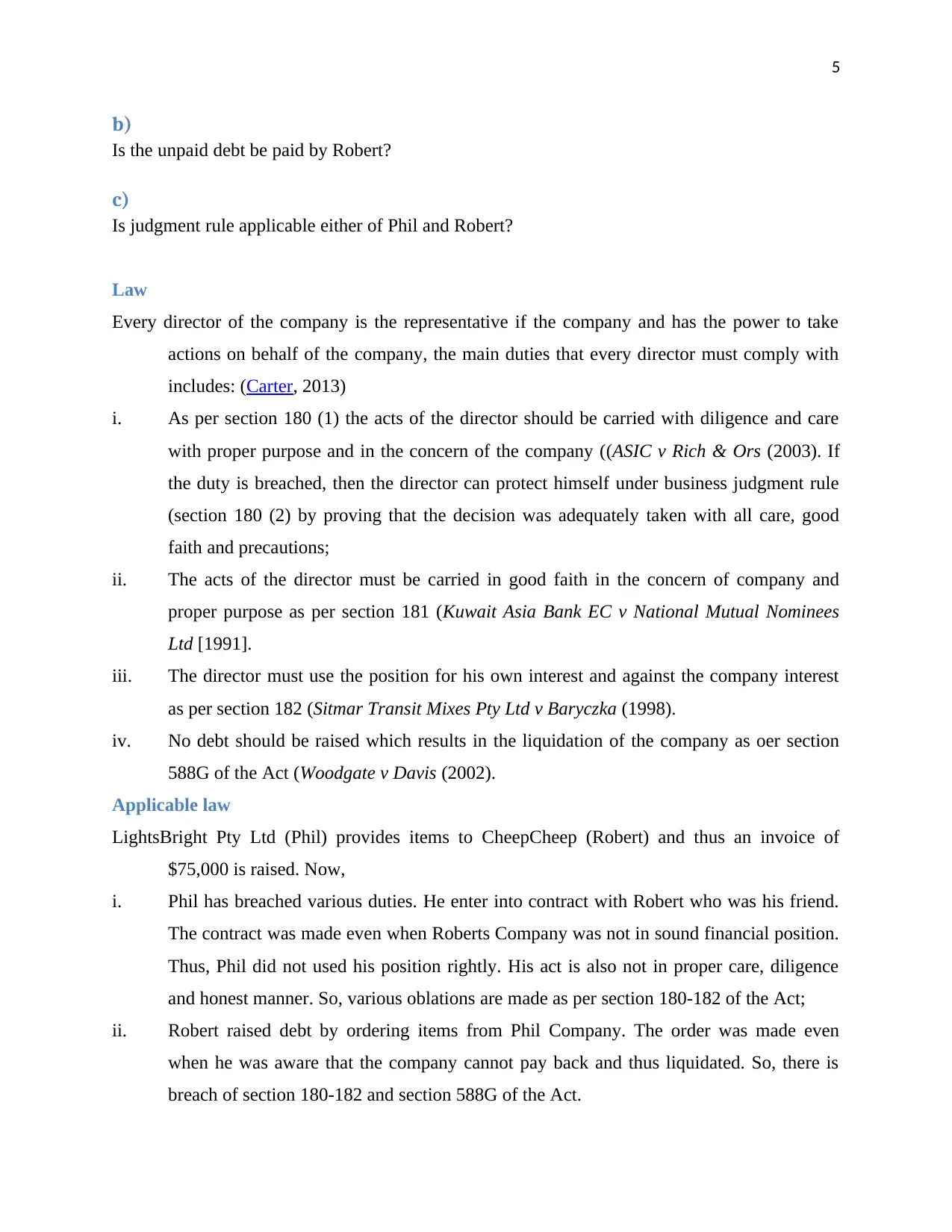
5
b)
Is the unpaid debt be paid by Robert?
c)
Is judgment rule applicable either of Phil and Robert?
Law
Every director of the company is the representative if the company and has the power to take
actions on behalf of the company, the main duties that every director must comply with
includes: (Carter, 2013)
i. As per section 180 (1) the acts of the director should be carried with diligence and care
with proper purpose and in the concern of the company ((ASIC v Rich & Ors (2003). If
the duty is breached, then the director can protect himself under business judgment rule
(section 180 (2) by proving that the decision was adequately taken with all care, good
faith and precautions;
ii. The acts of the director must be carried in good faith in the concern of company and
proper purpose as per section 181 (Kuwait Asia Bank EC v National Mutual Nominees
Ltd [1991].
iii. The director must use the position for his own interest and against the company interest
as per section 182 (Sitmar Transit Mixes Pty Ltd v Baryczka (1998).
iv. No debt should be raised which results in the liquidation of the company as oer section
588G of the Act (Woodgate v Davis (2002).
Applicable law
LightsBright Pty Ltd (Phil) provides items to CheepCheep (Robert) and thus an invoice of
$75,000 is raised. Now,
i. Phil has breached various duties. He enter into contract with Robert who was his friend.
The contract was made even when Roberts Company was not in sound financial position.
Thus, Phil did not used his position rightly. His act is also not in proper care, diligence
and honest manner. So, various oblations are made as per section 180-182 of the Act;
ii. Robert raised debt by ordering items from Phil Company. The order was made even
when he was aware that the company cannot pay back and thus liquidated. So, there is
breach of section 180-182 and section 588G of the Act.
b)
Is the unpaid debt be paid by Robert?
c)
Is judgment rule applicable either of Phil and Robert?
Law
Every director of the company is the representative if the company and has the power to take
actions on behalf of the company, the main duties that every director must comply with
includes: (Carter, 2013)
i. As per section 180 (1) the acts of the director should be carried with diligence and care
with proper purpose and in the concern of the company ((ASIC v Rich & Ors (2003). If
the duty is breached, then the director can protect himself under business judgment rule
(section 180 (2) by proving that the decision was adequately taken with all care, good
faith and precautions;
ii. The acts of the director must be carried in good faith in the concern of company and
proper purpose as per section 181 (Kuwait Asia Bank EC v National Mutual Nominees
Ltd [1991].
iii. The director must use the position for his own interest and against the company interest
as per section 182 (Sitmar Transit Mixes Pty Ltd v Baryczka (1998).
iv. No debt should be raised which results in the liquidation of the company as oer section
588G of the Act (Woodgate v Davis (2002).
Applicable law
LightsBright Pty Ltd (Phil) provides items to CheepCheep (Robert) and thus an invoice of
$75,000 is raised. Now,
i. Phil has breached various duties. He enter into contract with Robert who was his friend.
The contract was made even when Roberts Company was not in sound financial position.
Thus, Phil did not used his position rightly. His act is also not in proper care, diligence
and honest manner. So, various oblations are made as per section 180-182 of the Act;
ii. Robert raised debt by ordering items from Phil Company. The order was made even
when he was aware that the company cannot pay back and thus liquidated. So, there is
breach of section 180-182 and section 588G of the Act.
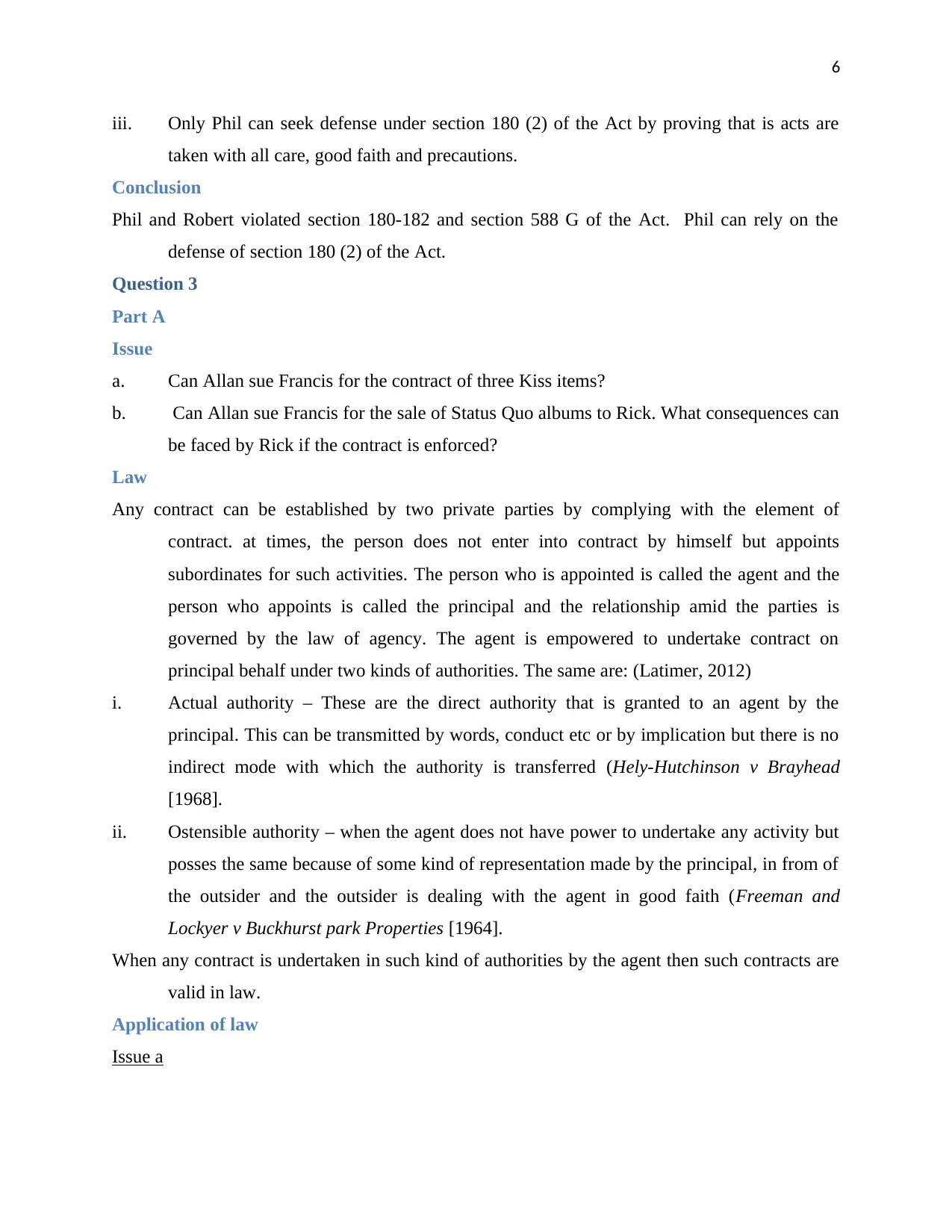
6
iii. Only Phil can seek defense under section 180 (2) of the Act by proving that is acts are
taken with all care, good faith and precautions.
Conclusion
Phil and Robert violated section 180-182 and section 588 G of the Act. Phil can rely on the
defense of section 180 (2) of the Act.
Question 3
Part A
Issue
a. Can Allan sue Francis for the contract of three Kiss items?
b. Can Allan sue Francis for the sale of Status Quo albums to Rick. What consequences can
be faced by Rick if the contract is enforced?
Law
Any contract can be established by two private parties by complying with the element of
contract. at times, the person does not enter into contract by himself but appoints
subordinates for such activities. The person who is appointed is called the agent and the
person who appoints is called the principal and the relationship amid the parties is
governed by the law of agency. The agent is empowered to undertake contract on
principal behalf under two kinds of authorities. The same are: (Latimer, 2012)
i. Actual authority – These are the direct authority that is granted to an agent by the
principal. This can be transmitted by words, conduct etc or by implication but there is no
indirect mode with which the authority is transferred (Hely-Hutchinson v Brayhead
[1968].
ii. Ostensible authority – when the agent does not have power to undertake any activity but
posses the same because of some kind of representation made by the principal, in from of
the outsider and the outsider is dealing with the agent in good faith (Freeman and
Lockyer v Buckhurst park Properties [1964].
When any contract is undertaken in such kind of authorities by the agent then such contracts are
valid in law.
Application of law
Issue a
iii. Only Phil can seek defense under section 180 (2) of the Act by proving that is acts are
taken with all care, good faith and precautions.
Conclusion
Phil and Robert violated section 180-182 and section 588 G of the Act. Phil can rely on the
defense of section 180 (2) of the Act.
Question 3
Part A
Issue
a. Can Allan sue Francis for the contract of three Kiss items?
b. Can Allan sue Francis for the sale of Status Quo albums to Rick. What consequences can
be faced by Rick if the contract is enforced?
Law
Any contract can be established by two private parties by complying with the element of
contract. at times, the person does not enter into contract by himself but appoints
subordinates for such activities. The person who is appointed is called the agent and the
person who appoints is called the principal and the relationship amid the parties is
governed by the law of agency. The agent is empowered to undertake contract on
principal behalf under two kinds of authorities. The same are: (Latimer, 2012)
i. Actual authority – These are the direct authority that is granted to an agent by the
principal. This can be transmitted by words, conduct etc or by implication but there is no
indirect mode with which the authority is transferred (Hely-Hutchinson v Brayhead
[1968].
ii. Ostensible authority – when the agent does not have power to undertake any activity but
posses the same because of some kind of representation made by the principal, in from of
the outsider and the outsider is dealing with the agent in good faith (Freeman and
Lockyer v Buckhurst park Properties [1964].
When any contract is undertaken in such kind of authorities by the agent then such contracts are
valid in law.
Application of law
Issue a
⊘ This is a preview!⊘
Do you want full access?
Subscribe today to unlock all pages.

Trusted by 1+ million students worldwide
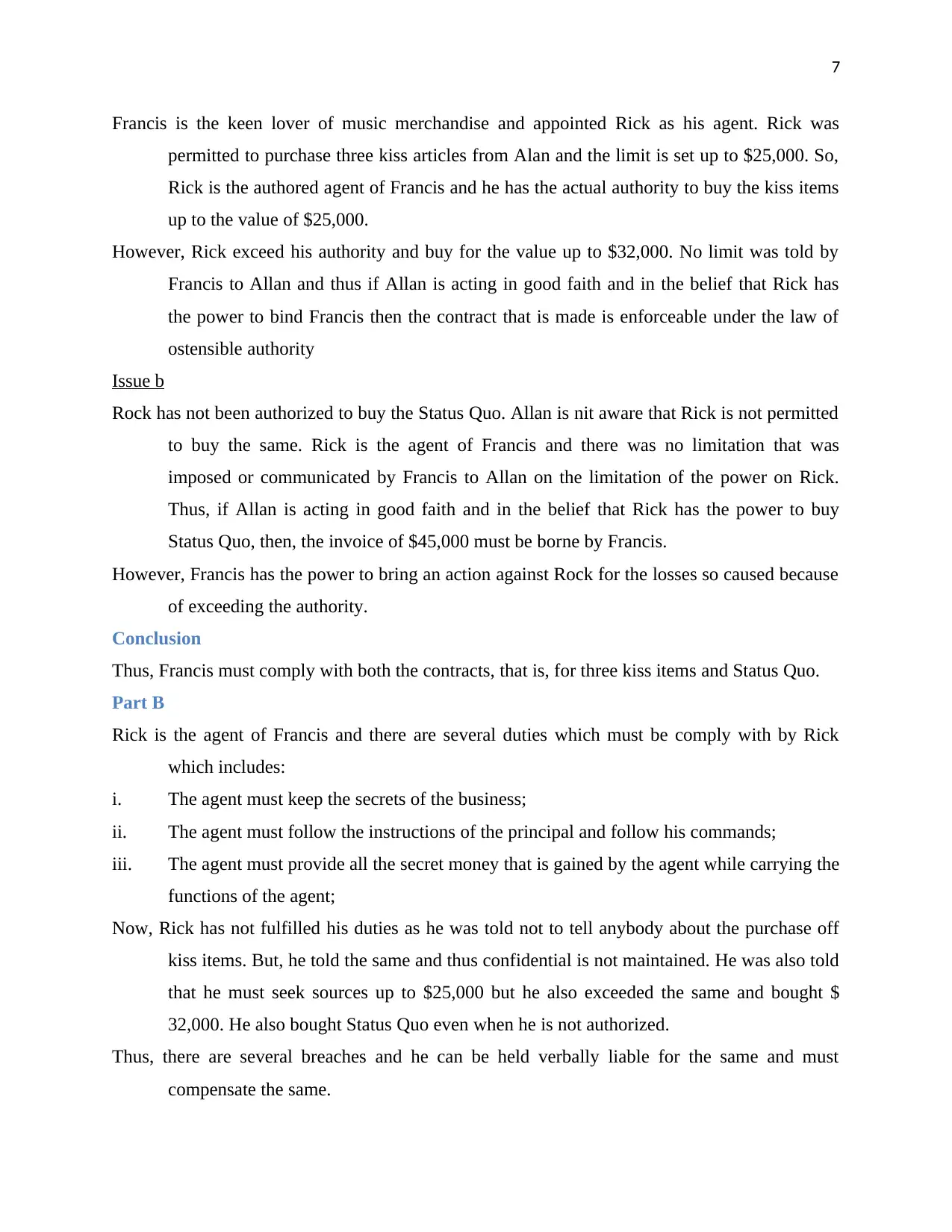
7
Francis is the keen lover of music merchandise and appointed Rick as his agent. Rick was
permitted to purchase three kiss articles from Alan and the limit is set up to $25,000. So,
Rick is the authored agent of Francis and he has the actual authority to buy the kiss items
up to the value of $25,000.
However, Rick exceed his authority and buy for the value up to $32,000. No limit was told by
Francis to Allan and thus if Allan is acting in good faith and in the belief that Rick has
the power to bind Francis then the contract that is made is enforceable under the law of
ostensible authority
Issue b
Rock has not been authorized to buy the Status Quo. Allan is nit aware that Rick is not permitted
to buy the same. Rick is the agent of Francis and there was no limitation that was
imposed or communicated by Francis to Allan on the limitation of the power on Rick.
Thus, if Allan is acting in good faith and in the belief that Rick has the power to buy
Status Quo, then, the invoice of $45,000 must be borne by Francis.
However, Francis has the power to bring an action against Rock for the losses so caused because
of exceeding the authority.
Conclusion
Thus, Francis must comply with both the contracts, that is, for three kiss items and Status Quo.
Part B
Rick is the agent of Francis and there are several duties which must be comply with by Rick
which includes:
i. The agent must keep the secrets of the business;
ii. The agent must follow the instructions of the principal and follow his commands;
iii. The agent must provide all the secret money that is gained by the agent while carrying the
functions of the agent;
Now, Rick has not fulfilled his duties as he was told not to tell anybody about the purchase off
kiss items. But, he told the same and thus confidential is not maintained. He was also told
that he must seek sources up to $25,000 but he also exceeded the same and bought $
32,000. He also bought Status Quo even when he is not authorized.
Thus, there are several breaches and he can be held verbally liable for the same and must
compensate the same.
Francis is the keen lover of music merchandise and appointed Rick as his agent. Rick was
permitted to purchase three kiss articles from Alan and the limit is set up to $25,000. So,
Rick is the authored agent of Francis and he has the actual authority to buy the kiss items
up to the value of $25,000.
However, Rick exceed his authority and buy for the value up to $32,000. No limit was told by
Francis to Allan and thus if Allan is acting in good faith and in the belief that Rick has
the power to bind Francis then the contract that is made is enforceable under the law of
ostensible authority
Issue b
Rock has not been authorized to buy the Status Quo. Allan is nit aware that Rick is not permitted
to buy the same. Rick is the agent of Francis and there was no limitation that was
imposed or communicated by Francis to Allan on the limitation of the power on Rick.
Thus, if Allan is acting in good faith and in the belief that Rick has the power to buy
Status Quo, then, the invoice of $45,000 must be borne by Francis.
However, Francis has the power to bring an action against Rock for the losses so caused because
of exceeding the authority.
Conclusion
Thus, Francis must comply with both the contracts, that is, for three kiss items and Status Quo.
Part B
Rick is the agent of Francis and there are several duties which must be comply with by Rick
which includes:
i. The agent must keep the secrets of the business;
ii. The agent must follow the instructions of the principal and follow his commands;
iii. The agent must provide all the secret money that is gained by the agent while carrying the
functions of the agent;
Now, Rick has not fulfilled his duties as he was told not to tell anybody about the purchase off
kiss items. But, he told the same and thus confidential is not maintained. He was also told
that he must seek sources up to $25,000 but he also exceeded the same and bought $
32,000. He also bought Status Quo even when he is not authorized.
Thus, there are several breaches and he can be held verbally liable for the same and must
compensate the same.
Paraphrase This Document
Need a fresh take? Get an instant paraphrase of this document with our AI Paraphraser
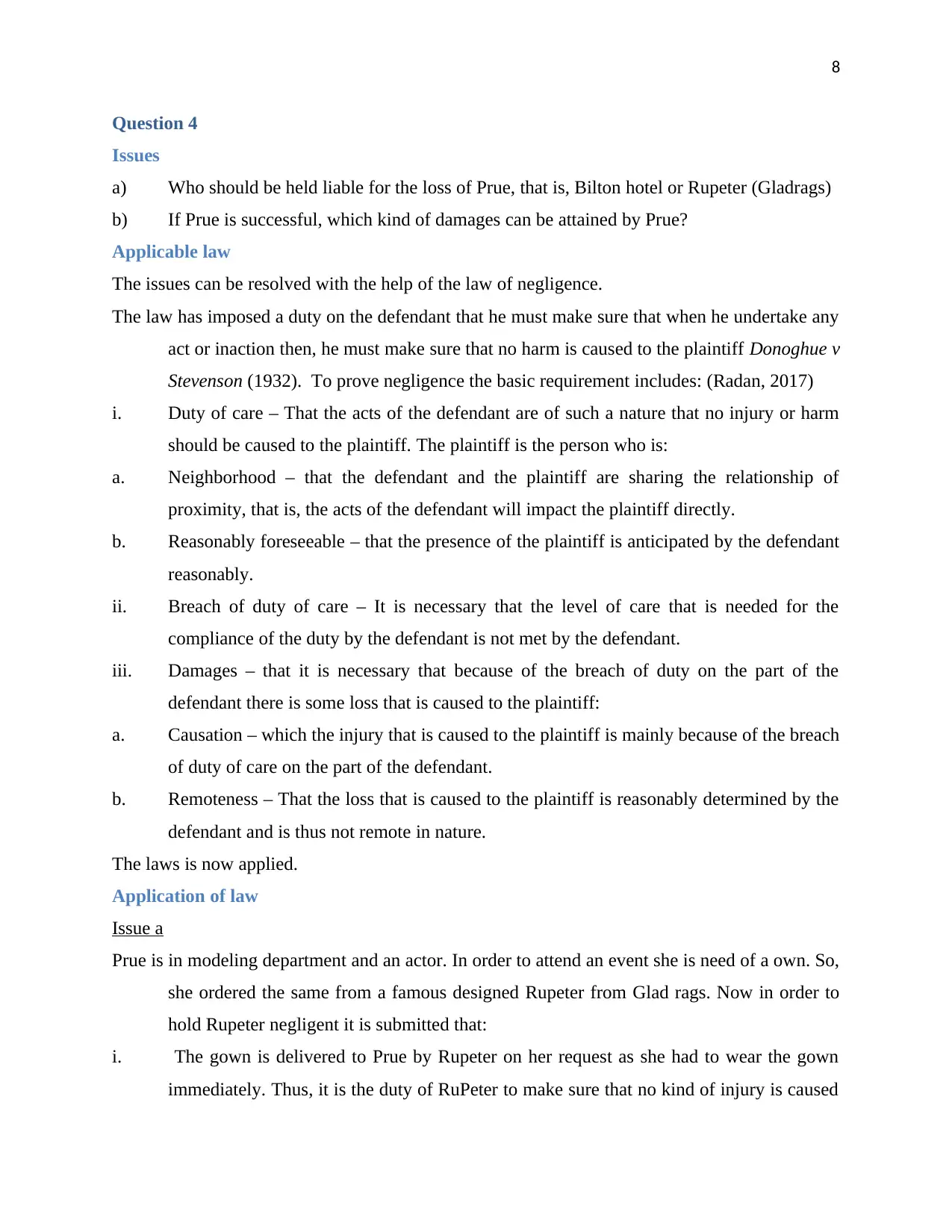
8
Question 4
Issues
a) Who should be held liable for the loss of Prue, that is, Bilton hotel or Rupeter (Gladrags)
b) If Prue is successful, which kind of damages can be attained by Prue?
Applicable law
The issues can be resolved with the help of the law of negligence.
The law has imposed a duty on the defendant that he must make sure that when he undertake any
act or inaction then, he must make sure that no harm is caused to the plaintiff Donoghue v
Stevenson (1932). To prove negligence the basic requirement includes: (Radan, 2017)
i. Duty of care – That the acts of the defendant are of such a nature that no injury or harm
should be caused to the plaintiff. The plaintiff is the person who is:
a. Neighborhood – that the defendant and the plaintiff are sharing the relationship of
proximity, that is, the acts of the defendant will impact the plaintiff directly.
b. Reasonably foreseeable – that the presence of the plaintiff is anticipated by the defendant
reasonably.
ii. Breach of duty of care – It is necessary that the level of care that is needed for the
compliance of the duty by the defendant is not met by the defendant.
iii. Damages – that it is necessary that because of the breach of duty on the part of the
defendant there is some loss that is caused to the plaintiff:
a. Causation – which the injury that is caused to the plaintiff is mainly because of the breach
of duty of care on the part of the defendant.
b. Remoteness – That the loss that is caused to the plaintiff is reasonably determined by the
defendant and is thus not remote in nature.
The laws is now applied.
Application of law
Issue a
Prue is in modeling department and an actor. In order to attend an event she is need of a own. So,
she ordered the same from a famous designed Rupeter from Glad rags. Now in order to
hold Rupeter negligent it is submitted that:
i. The gown is delivered to Prue by Rupeter on her request as she had to wear the gown
immediately. Thus, it is the duty of RuPeter to make sure that no kind of injury is caused
Question 4
Issues
a) Who should be held liable for the loss of Prue, that is, Bilton hotel or Rupeter (Gladrags)
b) If Prue is successful, which kind of damages can be attained by Prue?
Applicable law
The issues can be resolved with the help of the law of negligence.
The law has imposed a duty on the defendant that he must make sure that when he undertake any
act or inaction then, he must make sure that no harm is caused to the plaintiff Donoghue v
Stevenson (1932). To prove negligence the basic requirement includes: (Radan, 2017)
i. Duty of care – That the acts of the defendant are of such a nature that no injury or harm
should be caused to the plaintiff. The plaintiff is the person who is:
a. Neighborhood – that the defendant and the plaintiff are sharing the relationship of
proximity, that is, the acts of the defendant will impact the plaintiff directly.
b. Reasonably foreseeable – that the presence of the plaintiff is anticipated by the defendant
reasonably.
ii. Breach of duty of care – It is necessary that the level of care that is needed for the
compliance of the duty by the defendant is not met by the defendant.
iii. Damages – that it is necessary that because of the breach of duty on the part of the
defendant there is some loss that is caused to the plaintiff:
a. Causation – which the injury that is caused to the plaintiff is mainly because of the breach
of duty of care on the part of the defendant.
b. Remoteness – That the loss that is caused to the plaintiff is reasonably determined by the
defendant and is thus not remote in nature.
The laws is now applied.
Application of law
Issue a
Prue is in modeling department and an actor. In order to attend an event she is need of a own. So,
she ordered the same from a famous designed Rupeter from Glad rags. Now in order to
hold Rupeter negligent it is submitted that:
i. The gown is delivered to Prue by Rupeter on her request as she had to wear the gown
immediately. Thus, it is the duty of RuPeter to make sure that no kind of injury is caused
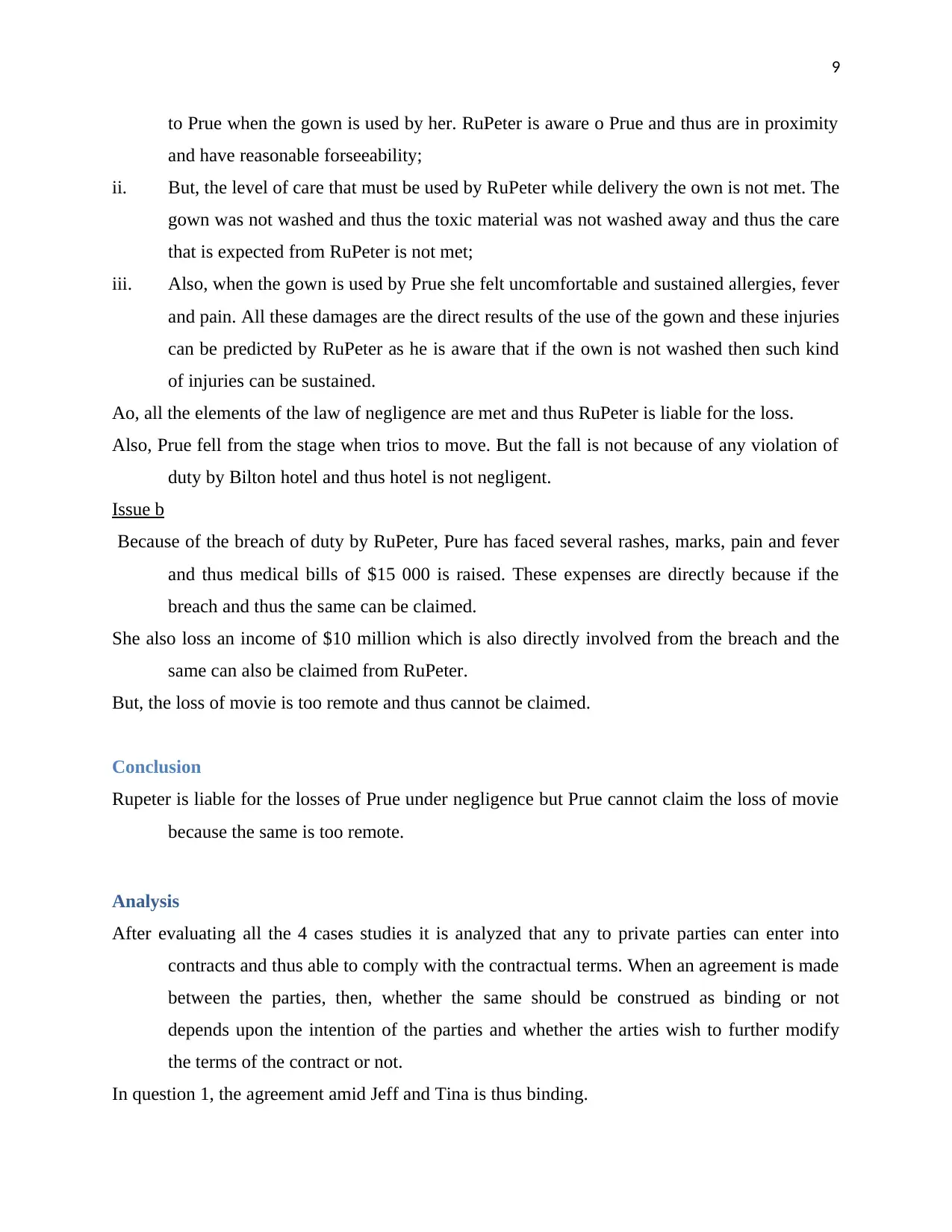
9
to Prue when the gown is used by her. RuPeter is aware o Prue and thus are in proximity
and have reasonable forseeability;
ii. But, the level of care that must be used by RuPeter while delivery the own is not met. The
gown was not washed and thus the toxic material was not washed away and thus the care
that is expected from RuPeter is not met;
iii. Also, when the gown is used by Prue she felt uncomfortable and sustained allergies, fever
and pain. All these damages are the direct results of the use of the gown and these injuries
can be predicted by RuPeter as he is aware that if the own is not washed then such kind
of injuries can be sustained.
Ao, all the elements of the law of negligence are met and thus RuPeter is liable for the loss.
Also, Prue fell from the stage when trios to move. But the fall is not because of any violation of
duty by Bilton hotel and thus hotel is not negligent.
Issue b
Because of the breach of duty by RuPeter, Pure has faced several rashes, marks, pain and fever
and thus medical bills of $15 000 is raised. These expenses are directly because if the
breach and thus the same can be claimed.
She also loss an income of $10 million which is also directly involved from the breach and the
same can also be claimed from RuPeter.
But, the loss of movie is too remote and thus cannot be claimed.
Conclusion
Rupeter is liable for the losses of Prue under negligence but Prue cannot claim the loss of movie
because the same is too remote.
Analysis
After evaluating all the 4 cases studies it is analyzed that any to private parties can enter into
contracts and thus able to comply with the contractual terms. When an agreement is made
between the parties, then, whether the same should be construed as binding or not
depends upon the intention of the parties and whether the arties wish to further modify
the terms of the contract or not.
In question 1, the agreement amid Jeff and Tina is thus binding.
to Prue when the gown is used by her. RuPeter is aware o Prue and thus are in proximity
and have reasonable forseeability;
ii. But, the level of care that must be used by RuPeter while delivery the own is not met. The
gown was not washed and thus the toxic material was not washed away and thus the care
that is expected from RuPeter is not met;
iii. Also, when the gown is used by Prue she felt uncomfortable and sustained allergies, fever
and pain. All these damages are the direct results of the use of the gown and these injuries
can be predicted by RuPeter as he is aware that if the own is not washed then such kind
of injuries can be sustained.
Ao, all the elements of the law of negligence are met and thus RuPeter is liable for the loss.
Also, Prue fell from the stage when trios to move. But the fall is not because of any violation of
duty by Bilton hotel and thus hotel is not negligent.
Issue b
Because of the breach of duty by RuPeter, Pure has faced several rashes, marks, pain and fever
and thus medical bills of $15 000 is raised. These expenses are directly because if the
breach and thus the same can be claimed.
She also loss an income of $10 million which is also directly involved from the breach and the
same can also be claimed from RuPeter.
But, the loss of movie is too remote and thus cannot be claimed.
Conclusion
Rupeter is liable for the losses of Prue under negligence but Prue cannot claim the loss of movie
because the same is too remote.
Analysis
After evaluating all the 4 cases studies it is analyzed that any to private parties can enter into
contracts and thus able to comply with the contractual terms. When an agreement is made
between the parties, then, whether the same should be construed as binding or not
depends upon the intention of the parties and whether the arties wish to further modify
the terms of the contract or not.
In question 1, the agreement amid Jeff and Tina is thus binding.
⊘ This is a preview!⊘
Do you want full access?
Subscribe today to unlock all pages.

Trusted by 1+ million students worldwide
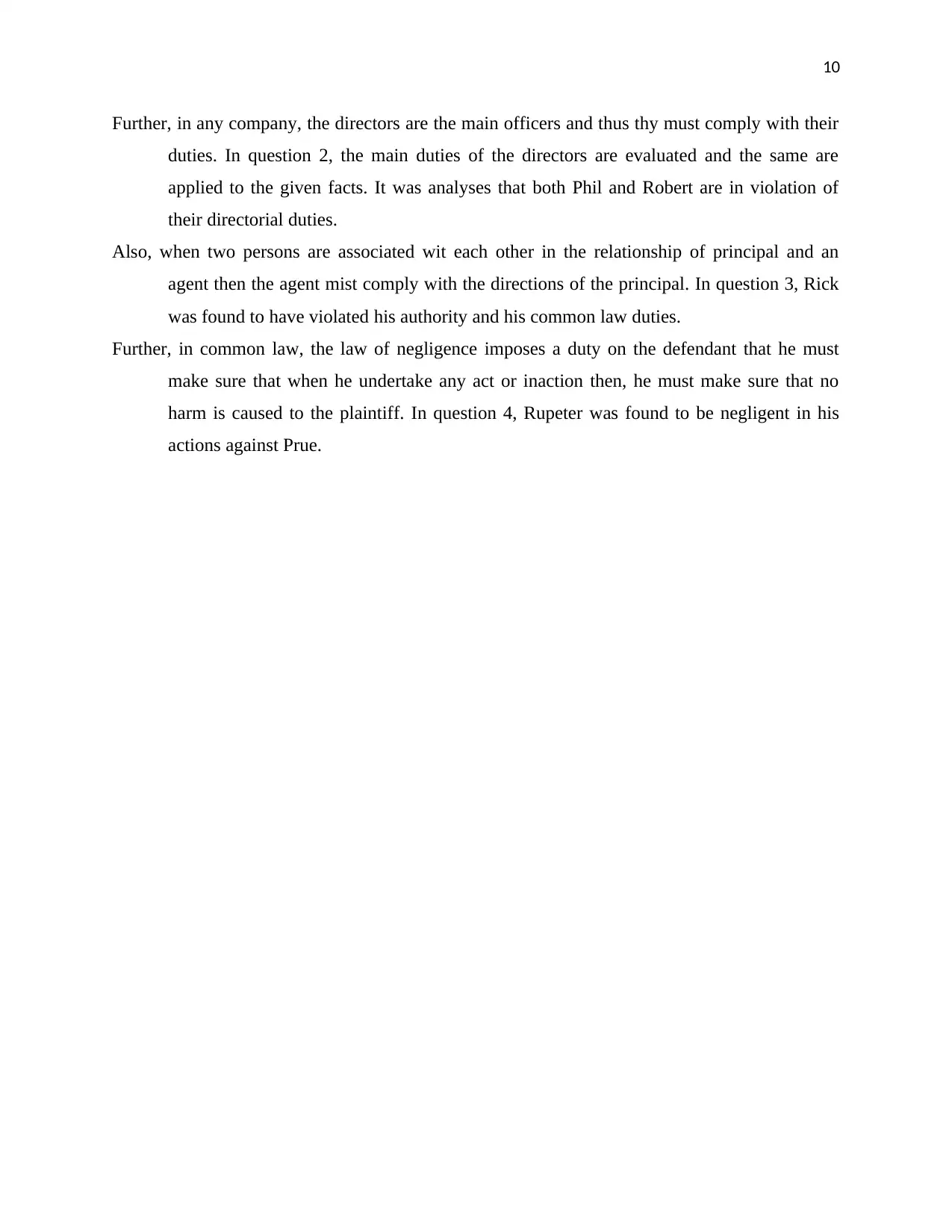
10
Further, in any company, the directors are the main officers and thus thy must comply with their
duties. In question 2, the main duties of the directors are evaluated and the same are
applied to the given facts. It was analyses that both Phil and Robert are in violation of
their directorial duties.
Also, when two persons are associated wit each other in the relationship of principal and an
agent then the agent mist comply with the directions of the principal. In question 3, Rick
was found to have violated his authority and his common law duties.
Further, in common law, the law of negligence imposes a duty on the defendant that he must
make sure that when he undertake any act or inaction then, he must make sure that no
harm is caused to the plaintiff. In question 4, Rupeter was found to be negligent in his
actions against Prue.
Further, in any company, the directors are the main officers and thus thy must comply with their
duties. In question 2, the main duties of the directors are evaluated and the same are
applied to the given facts. It was analyses that both Phil and Robert are in violation of
their directorial duties.
Also, when two persons are associated wit each other in the relationship of principal and an
agent then the agent mist comply with the directions of the principal. In question 3, Rick
was found to have violated his authority and his common law duties.
Further, in common law, the law of negligence imposes a duty on the defendant that he must
make sure that when he undertake any act or inaction then, he must make sure that no
harm is caused to the plaintiff. In question 4, Rupeter was found to be negligent in his
actions against Prue.
1 out of 10
Related Documents
Your All-in-One AI-Powered Toolkit for Academic Success.
+13062052269
info@desklib.com
Available 24*7 on WhatsApp / Email
![[object Object]](/_next/static/media/star-bottom.7253800d.svg)
Unlock your academic potential
Copyright © 2020–2026 A2Z Services. All Rights Reserved. Developed and managed by ZUCOL.





